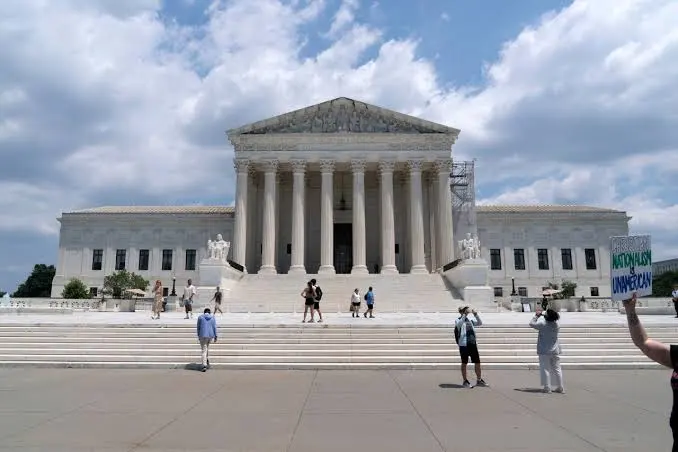CurrentReport Blog In a landmark decision on Friday, the U.S. Supreme Court ruled that American citizens do not have the constitutional right to challenge the denial of visas for their foreign spouses.
This decision underscores the government’s broad authority over immigration matters and closes a contentious debate about the rights of U.S. citizens in such cases.
The ruling came from the case Department of State v. Sandra Munoz (No. 23-334), where the Supreme Court delivered a 6-3 verdict, emphasizing that the constitutional rights of U.S. citizens are not breached when their non-citizen spouses are barred from entering the country without a detailed explanation.
Sandra Munoz, a U.S. citizen and a prominent civil rights lawyer, found herself at the center of this legal battle after her husband’s visa application was denied. Munoz’s husband, an El Salvadoran national, had been waiting for over three years when the U.S. Department of State finally cited suspicions of gang affiliation as the reason for his visa denial. Despite Munoz’s efforts to seek justice, the Supreme Court’s decision now sets a precedent that U.S. citizens cannot challenge such denials in court.
The Supreme Court’s majority opinion, led by Chief Justice John Roberts, asserted that the federal government holds sovereign control over immigration matters. The ruling reinforces the longstanding principle that immigration decisions, particularly those involving national security concerns, are largely insulated from judicial review.
“The authority to control immigration is vested in the legislative and executive branches,” Roberts wrote, emphasizing the need to balance individual rights against national security and immigration control considerations.
This ruling has significant implications for U.S. citizens married to foreign nationals. It effectively means that they have limited recourse if their spouse’s visa application is denied, even if the denial is based on broad or unsubstantiated claims. The decision could impact thousands of families who may face prolonged separations without clear explanations or opportunities for appeal.
Critics argue that this decision undermines the constitutional rights of American citizens and leaves them vulnerable to opaque and potentially arbitrary immigration decisions. The dissenting opinion, penned by Justice Sonia Sotomayor, highlighted these concerns, stating, “American citizens should not be denied their fundamental rights without due process.”
For individuals like Sandra Munoz, the ruling marks a significant legal and emotional setback. However, the fight for transparency and fairness in visa adjudications is far from over. Immigration advocates and civil rights groups are likely to push for legislative changes to provide more clarity and oversight in the visa process.
Meanwhile, U.S. citizens seeking to reunite with their foreign spouses must navigate a complex and often unforgiving immigration system. Legal experts advise staying informed and seeking professional guidance to understand the intricacies of visa applications and potential legal challenges.
The Supreme Court’s ruling in Department of State v. Sandra Munoz solidifies the U.S. government’s sweeping authority over visa decisions, limiting the legal avenues available to American citizens contesting the denial of their foreign spouses’ entry into the country. As the implications of this decision unfold, it highlights the ongoing tension between individual rights and governmental control in the realm of U.S. immigration policy.












